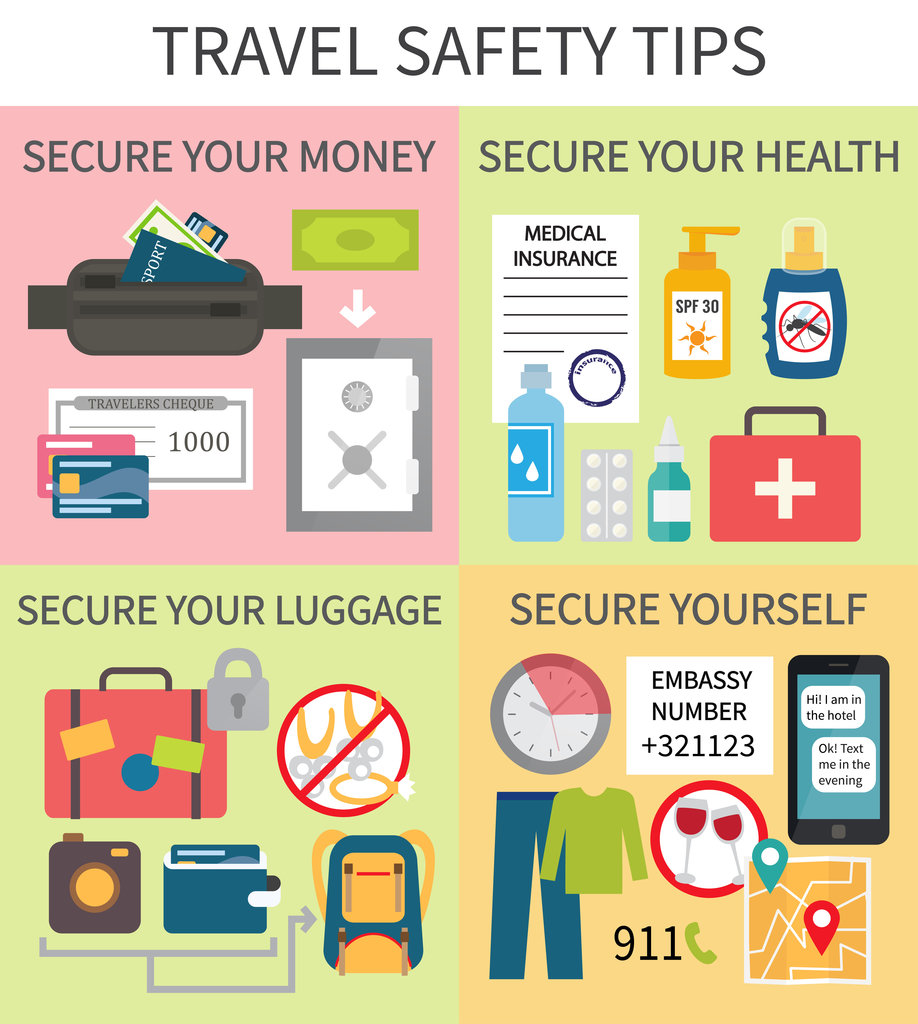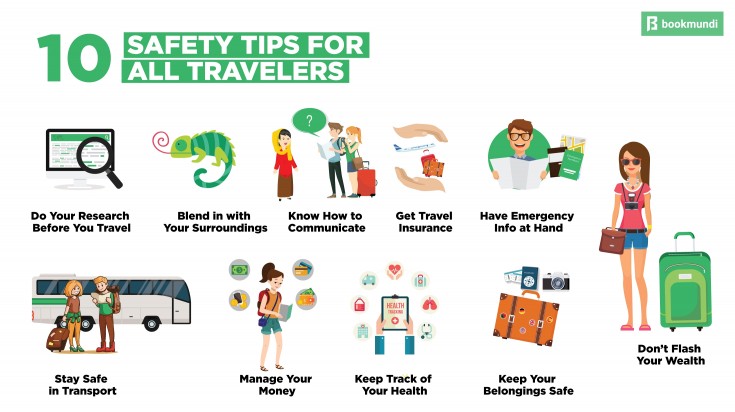Travel Safety: Essential Tips for a Secure Journey
Traveling is an exciting adventure, but it’s important to keep safety at the forefront of your plans. Whether you’re venturing to a far-off destination or exploring a nearby city, knowing how to stay safe can make all the difference in ensuring a smooth trip. In this guide, we’ll cover the most important travel safety tips to keep in mind, helping you to avoid potential risks and enjoy your trip with peace of mind.

1. Plan Your Trip in Advance
Pre-trip preparation is the key to reducing travel risks. Before you embark on your journey, make sure you’ve done thorough research about your destination. Here are some important steps to follow:
- Check travel advisories: Stay updated on any travel warnings from government agencies such as the U.S. Department of State.
- Know the local emergency numbers: Research the emergency numbers for your destination. In many countries, dialing “112” will connect you to emergency services.
- Accommodation safety: Choose well-reviewed accommodations that offer safety features, such as 24/7 security, secure entry, and smoke alarms.
These small preparations can greatly reduce potential safety risks once you’re on the move.
2. Stay Connected with Loved Ones
One of the easiest ways to stay safe while traveling is to maintain communication with someone back home. Whether it’s a friend, family member, or colleague, having someone who knows where you are and what you’re up to can provide peace of mind.
- Share your itinerary: Let someone know your flight details, hotel addresses, and any other travel plans.
- Set check-in times: Schedule regular check-ins via text or a phone call to confirm your safety.
- Use tracking apps: Some apps, like Find My Friends, allow you to share your location with trusted contacts.
By staying connected, you’re not only ensuring safety but also fostering accountability.
3. Secure Your Belongings
When traveling, your personal belongings are often at risk of theft, so securing your valuables is crucial. Use these strategies to protect your possessions:
- Use anti-theft bags: Invest in bags with lockable zippers, hidden pockets, and RFID-blocking features.
- Use a money belt: Keep important documents, cash, and cards in a money belt or neck pouch.
- Stay alert in crowded areas: Pickpockets often target tourists in busy locations such as markets, transportation hubs, and tourist attractions.
Taking these precautions can help prevent theft and give you greater peace of mind while exploring.

4. Avoid Risky Areas
Not all parts of a city or country are safe to explore. To minimize the risk of crime or accidents, it’s essential to know which areas to avoid. Here’s how you can assess safety:
- Do local research: Check online forums, travel blogs, and local news websites to learn about areas that are known for being unsafe.
- Ask locals: Once you arrive, ask hotel staff or local guides about neighborhoods to avoid, especially after dark.
- Trust your instincts: If an area feels unsafe, trust your gut and leave the area.
By avoiding high-risk zones, you reduce the likelihood of encountering dangerous situations.
5. Be Cautious with Transportation
Whether you’re traveling by taxi, public transit, or rental car, transportation safety is critical. Here’s how to stay safe on the move:
- Use reputable transport services: Opt for licensed taxis or trusted ride-sharing services like Uber or Lyft.
- Seatbelts and helmets: Always wear seatbelts when in a vehicle, and helmets when riding bikes or motorcycles.
- Avoid traveling late at night: If possible, try to avoid public transportation or walking around in unfamiliar places after dark.
Taking these precautions can significantly reduce your risk while traveling from one place to another.
6. Keep Health and Travel Insurance
A travel insurance policy that includes health coverage is one of the best ways to protect yourself against unexpected situations, such as medical emergencies, lost luggage, or canceled flights. Before booking your trip, ensure that you:
- Review insurance policies: Make sure your insurance covers the specific risks of your destination, such as medical care, trip cancellation, or theft.
- Know where the nearest hospital is: Familiarize yourself with the location of nearby medical facilities and emergency services.
By securing travel insurance and understanding local medical resources, you can focus on enjoying your trip without worrying about unexpected setbacks.

7. Stay Safe Online
Cybersecurity is an often overlooked aspect of travel safety. Protecting your personal information while traveling is just as important as protecting your physical safety. Follow these tips to stay secure online:
- Use VPNs: When connecting to public Wi-Fi networks, use a Virtual Private Network (VPN) to protect your personal data.
- Avoid sharing travel details publicly: Refrain from posting real-time updates about your travels on social media.
- Enable two-factor authentication: For accounts like email and banking, enable two-factor authentication to add an extra layer of protection.
These measures can help safeguard your personal and financial information while you’re traveling.
8. Be Prepared for Natural Disasters
While it’s impossible to predict natural disasters, it’s important to prepare for the unexpected. Here’s how you can stay safe during such events:
- Know the risks: Some regions are prone to specific natural disasters, such as earthquakes, hurricanes, or floods. Learn about the potential risks in your destination before you go.
- Follow local advice: In the event of a disaster, follow local authorities’ instructions on evacuation routes or sheltering.
- Pack an emergency kit: Carry basic supplies like a first aid kit, flashlight, water, and snacks in case of emergencies.
By being informed and prepared, you can navigate potentially dangerous situations with more confidence.
9. Stay Hydrated and Nourished
Traveling can often involve long journeys, jet lag, and unfamiliar climates. To keep your body in top condition, make sure you stay hydrated and well-nourished throughout your trip:
- Drink plenty of water: Keep a refillable water bottle with you to stay hydrated, especially in hot climates or during long flights.
- Eat local, but wisely: Try local foods, but be cautious of street food or items that may upset your stomach.
Maintaining your health is crucial to staying energized and capable of handling unexpected challenges.
10. Use Local Resources for Safety
Whenever possible, make use of local resources to enhance your safety while traveling:
- Tourist Information Centers: These centers can provide maps, brochures, and advice on the safest places to visit and areas to avoid.
- Local apps: Many cities offer safety apps that provide real-time updates on local crime, weather, or transportation disruptions.
By tapping into local expertise, you can stay one step ahead and avoid unnecessary risks.
Frequently Asked Questions (FAQs)
How do I stay safe while traveling solo?
Traveling alone can be safe, but it requires extra caution. Always inform someone about your whereabouts, avoid risky areas, and stay connected with loved ones.
What are the best ways to protect my belongings?
Use anti-theft bags, lock your luggage, and always be aware of your surroundings, especially in crowded places.
Is travel insurance necessary?
Yes, travel insurance is highly recommended. It can provide financial protection in case of medical emergencies, trip cancellations, or lost belongings.
Travel safety is all about being proactive, prepared, and aware of your surroundings. By following these travel safety tips, you’ll not only reduce your risks but also have a more enjoyable and memorable experience. Stay informed, stay safe, and travel smart!
